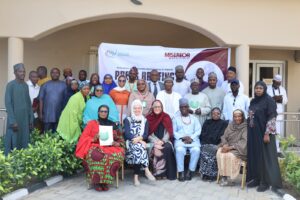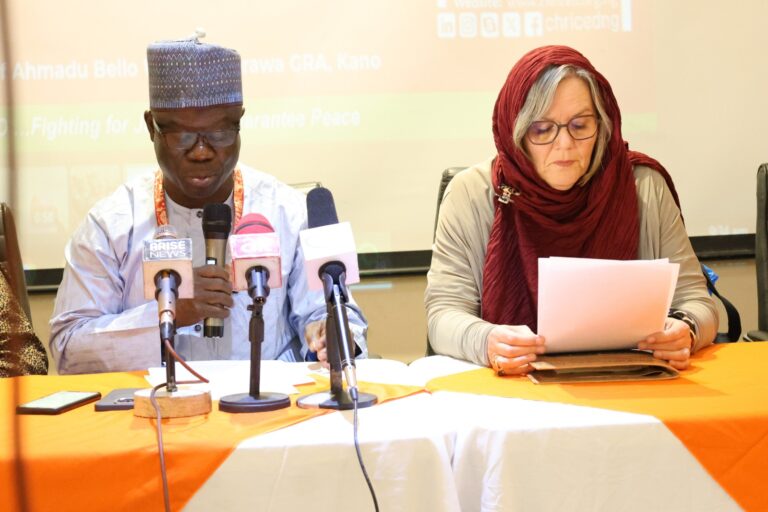The Resource Centre for Human Rights and Civic Education (CHRICED) has expressed grave concern over what it describes as Nigeria’s rapid descent into political disorder, severe economic hardship, and a frightening deterioration of national security.
Speaking at a State of the Nation press conference held on Monday in Kano, CHRICED’s Executive Director, Comrade Dr. Ibrahim M. Zikirullahi, said the country is “sliding into a dangerous phase” that threatens democratic governance and the very survival of citizens.
Dr. Zikirullahi observed that the political environment has become increasingly unstable, especially with the growing trend of defections among governors and lawmakers ahead of the 2027 elections.
According to him, these political migrations reflect “a desperate scramble for personal survival,” rather than loyalty to ideology or service to the people. He described the situation as a serious danger to the credibility of Nigeria’s democratic processes.
He also drew attention to a disturbing allegation reported in the media that lawmakers now pay between ₦1 million and ₦3 million to present motions or bills on the floor of the National Assembly.
READ ALSO: CHRICED Demands Wike’s Sack Over Clash With Military Officer
He said this claim speaks to an entrenched culture of transactional politics that undermines the legislature’s independence and erodes the people’s trust. “When the parliament—the heart of our democracy, becomes monetised, the future of governance itself is at risk,” he stated.

Adding to the political concerns, Dr. Zikirullahi referenced the claim made recently by the Chief Whip of the Senate, Senator Ali Ndume, who alleged that presidential aides demand bribes before granting access to President Bola Ahmed Tinubu.
He described the presidency’s refusal to respond to such weighty allegations as troubling and damaging to public confidence. According to him, silence in the face of corruption allegations is an affront to transparency and accountability.
Turning to the economy, the Executive Director questioned the government’s narrative of “stable naira” and “declining inflation,” arguing that these numbers have provided no relief for ordinary Nigerians.
Despite official claims of progress, the prices of basic food items continue to rise, unemployment remains widespread, and households are sinking deeper into poverty.
Dr. Zikirullahi criticised the government’s continued heavy borrowing, despite claims that it exceeded its 2025 revenue target as far back as August, saying there is no coherent strategy for economic recovery. “Nigerians are being taxed, squeezed, and impoverished, while the country is being mortgaged to lenders,” he said.
READ ALSO: CHRICED Demands Justice For Assaulted Corps Member
On the worsening security situation, he warned that many Nigerians now live in perpetual fear. Dr. Zikirullahi described the situation as a national emergency, citing cases of kidnapping, banditry, terrorism, ritual killings, and communal violence occurring in several parts of the country.
He highlighted the recent abduction of six directors of the Ministry of Defence in Kogi State, whose kidnappers reportedly demanded ₦150 million ransom, as an example of the vulnerability of even senior government officials. “If officials of the Ministry of Defence can be abducted with such ease, what hope do ordinary citizens have?” he asked.
He further noted that recent concerns expressed by the United States about Nigeria’s security management expose how grave and globally visible the nation’s security lapses have become.
According to him, these developments call for urgent reforms in intelligence gathering, operational coordination, and rapid response systems. “A nation that cannot protect its citizens cannot claim legitimacy,” he warned.
CHRICED also condemned the state of the country’s health sector, describing it as dangerously underfunded and poorly managed. Dr. Zikirullahi said government spending on health stands at only about five percent of the national budget, far below the 15 percent target agreed under the Abuja Declaration. Compounding the problem, only 36 percent of the capital health budget was reportedly released, preventing critical investments in hospitals and medical equipment.
He noted that about 75 percent of healthcare spending still comes directly from citizens’ pockets, pushing millions into financial distress. Meanwhile, enrollment in the national health insurance scheme remains very low, leaving most Nigerians exposed to medical emergencies.
The ongoing nationwide doctors’ strike, he said, is making the situation even worse, with patients being turned away from hospitals or dying due to lack of care. “Nigerians are paying with their lives for the failures of those entrusted with managing the health system,” he added.
Despite the grim national outlook, Dr. Zikirulahi highlighted major progress recorded through its Free Maternal and Child Healthcare (FMCH) project in Kano State, supported by Misereor/KZE of Germany.
Dr. Zikirullahi said CHRICED has developed a costed action plan for implementing the FMCH Law, trained civil society watchdogs, journalists, and community monitors, and launched multilingual radio campaigns to raise awareness.
According to him, the organisation has also distributed 4,000 simplified copies of the FMCH Law across all 44 local government areas of Kano State, and convened town halls and consultative meetings to bridge gaps between citizens and duty bearers.
READ ALSO: CHRICED Partners Abuja Varsity To Establish Heritage Centre For FCT Indigenous Communities
“These interventions are saving lives,” he said. “Every mother who survives childbirth and every child who receives care is proof that accountability works. We have shown that when government policy is effectively monitored and citizens are informed, impact follows.”
Dr. Zikirullahi reaffirmed CHRICED’s longstanding commitment to defending the rights of the Original Inhabitants of the Federal Capital Territory, who have endured decades of displacement and systemic marginalization.
He called on the federal government to address their grievances and ensure their inclusion in national development policies, noting that justice delayed for these communities is justice denied. He also urged Nigerian leaders across all levels of government to demonstrate genuine commitment to transparency, security, and human welfare.
He called on citizens—especially young people—to remain engaged, resist intimidation, and actively hold leaders accountable. “We must not surrender our country to incompetence and impunity,” he declared. “Nigeria can rise again, but only if the people demand it and the leadership listens.”

